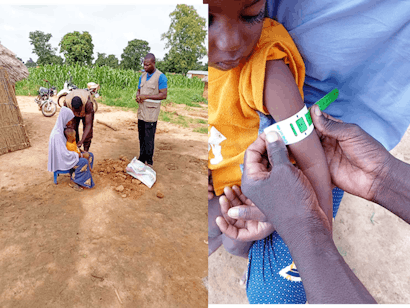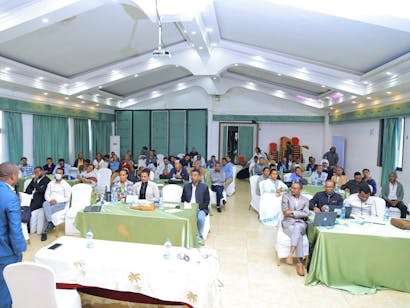N4G 2025: Ethiopia Drives Change

At the 2025 Nutrition for Growth (N4G) Summit in Paris, Ethiopia reaffirmed its leadership in gender-responsive nutrition, putting women and girls at the center of national development priorities. The CASCADE program stood out as a proven model for translating policy commitments into real impact on the ground.
CASCADE’s Gender-Nutrition Approach
In Amhara, CASCADE applies three integrated strategies designed to address the root causes of malnutrition. These approaches influence behaviors, expand access to resources, and strengthen service delivery systems. Together, they create a coherent model that connects social change, economic participation, and health service improvement.
- Shifting Social Norms: Social Analysis and Action (SAA) promotes shared caregiving and decision-making. Community figures, such as Priest Bogale, have supported this work at scale.
- Economic Empowerment: Village Savings and Loan Associations (VSLAs) support women to generate income and improve household food security. In Amba Mariam Kebele, women like Achash Wale are expanding small businesses.
- Strengthening Services: CASCADE has trained over 2,000 health workers on adolescent, maternal, Infant and Young Child nutrition. Services such as growth monitoring and iron supplementation now reach more households.
Ethiopia’s N4G Paris 2025 Commitments
At the summit, Ethiopia announced a set of national nutrition targets supported by policy direction and resource mobilization to accelerate progress by 2030. These commitments reflect the government’s intent to institutionalize effective interventions, strengthen accountability, and scale sustainable, community-led approaches like CASCADE
Key targets include:
• Reduce under-5 stunting from 39% to 23.4%
• Eliminate stunting among children under 2
• Reduce anemia in women from 20% to 13%
• Raise exclusive breastfeeding to 85%
• Increase minimum dietary diversity for children (6–23 months) from 8% to 50%
• Increase dietary diversity among women of reproductive age from 7% to 50%
• Halve micronutrient deficiencies in women
Food System Priorities:
• Ensure 60% of wheat flour industries fortify their products
• Establish food systems and nutrition councils at all levels
Financing Commitments:
• Mobilize $638 million (25% of the $2.55 billion required by 2030)
• Build robust systems to allocate, tag, and track nutrition financing
These targets were presented during a government-led side event at the summit, where Ethiopia outlined its roadmap for implementation. CASCADE was featured as a practical model for achieving these ambitions, demonstrating how national policy can be translated into local impact by strengthening systems, expanding inclusive services, and empowering women and girls. Speaking on behalf of the program team, Christine Campeau emphasized that community-driven, gender-responsive approaches like CASCADE are critical to delivering on Ethiopia’s N4G commitments.
"When policies come from the people they’re meant to serve, they don’t just sound good; they work. That’s what CASCADE is all about”
Christine Campeau, CARE
Key Takeaways from the N4G Sessions: What Ethiopia Can Build On

Across other sessions, a powerful, consistent message came through: to meet nutrition goals, we must work across sectors, empower communities, and invest smarter
- Food Fortification emerged as a high-impact solution—every $1 invested returns $27. For Ethiopia, better regulation and accessibility are critical next steps.
- Adolescent Nutrition is still chronically underfunded, with only 6% of previous N4G investments directed toward this age group. Ethiopia must prioritize school-based and girl-centered programs.
- Youth Engagement is essential for sustainability. Structured platforms and funding are needed to bring Ethiopian youth voices into policy spaces.
- The rise of Diet-Related Non-Communicable Diseases, especially in urban areas, calls for urgent interventions’ stronger food labeling, healthier school meals, and better regulation of ultra-processed foods.
- Coalition-building was underscored as key to success. Ethiopia’s Seqota Declaration is a leading example, but broader engagement, particularly at the local level is needed.
- On Nutrition Financing, transparency and tracking are critical. Ethiopia must scale up domestic resource mobilization and ensure commitments are matched by national budget allocations.
- Strong political leadership must continue to champion nutrition at the highest levels, turning bold commitments into real action and funding.
Why It Matters: From Paris to Ethiopia, the Momentum Must Continue
The N4G Summit underscored a critical truth: nutrition services are only effective when they are inclusive, accessible, and grounded in the lived realities of women and girls. CASCADE remains committed to advancing this approach every day, translating principles into practice across communities.
At the “Equal Plates, Equal Futures” session, the urgency of gender-nutrition transformation was clear. Alongside fellow speakers, I emphasized that nutrition systems must move beyond short-term interventions. To be truly responsive, they must address the root causes of malnutrition, social norms, unequal access to services, and the exclusion of women and girls from decision-making spaces.
From Commitment to Action: Ethiopia’s Post-N4G Workshop
On April 23rd, national stakeholders convened in Addis Ababa for Ethiopia’s post-N4G workshop to translate summit commitments into actionable next steps. CASCADE contributed to the dialogue by reinforcing the importance of sustained advocacy, the integration of N4G priorities into national strategies such as the Seqota Declaration, and the establishment of a Technical Working Group to drive accountability through 2030.
Looking Ahead: Vision 2030
Achieving Ethiopia’s nutrition goals by 2030 will require collective ambition, national ownership, and sustained investment. A successful future will mean:
✅ Functional, multisectoral platforms delivering coordinated, high-impact nutrition services
✅ Women and girls actively leading nutrition decisions at home and in their communities
✅ Inclusive and equitable services that reach the most vulnerable and leave no one behind
To realize this vision, continued partnership is essential. CASCADE will remain a committed ally implementing proven approaches, advocating for systemic change, and scaling solutions that work. Now is the time to turn bold commitments into measurable impact. When we ensure equal plates, we build equal futures.
Authored by: Metasebia Legesse, Senior Health and Nutrition Advisor, CARE, CASCADE Ethiopia
©2025


